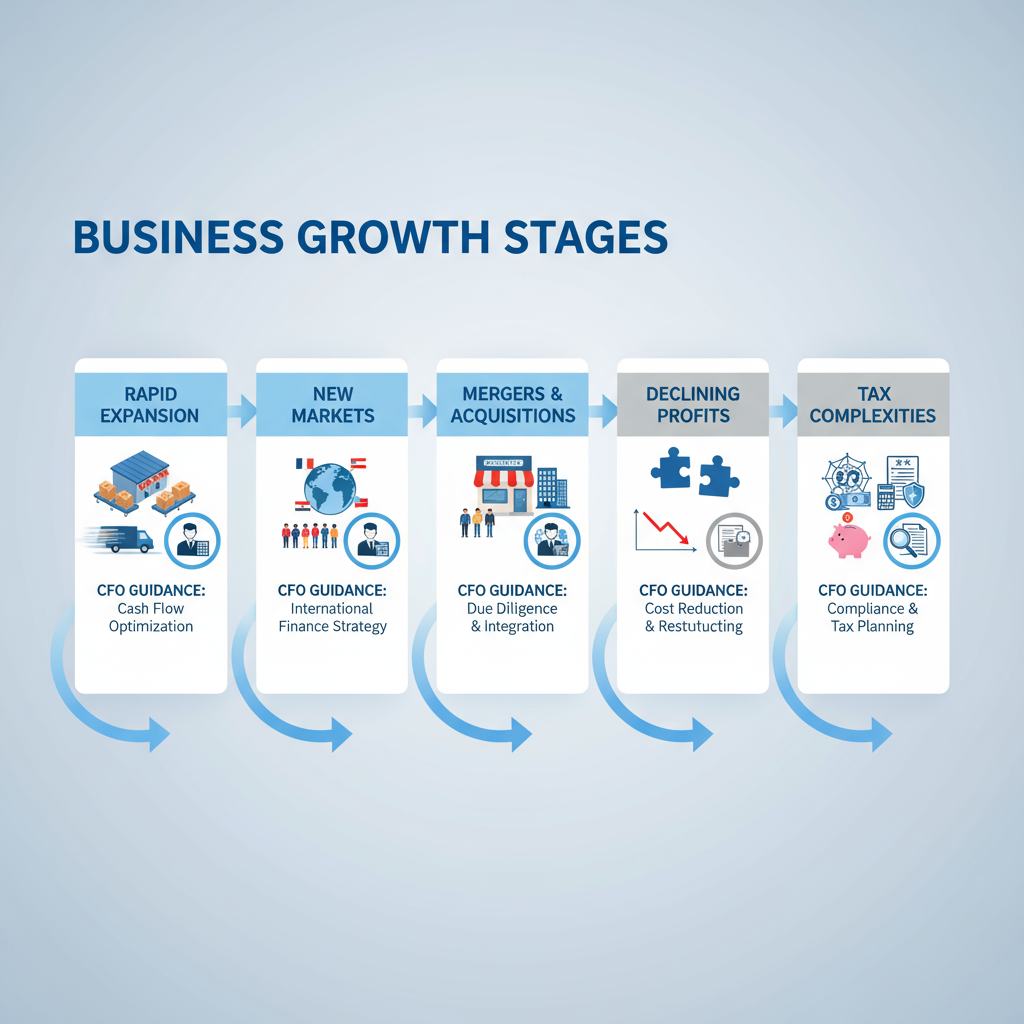Summary
Every successful company, at some point, outgrows its existing financial setup. When that happens, the question arises — “When do you need a CFO?” or “When to hire a CFO?”
A Chief Financial Officer (CFO) is not just a financial manager — they are the strategic backbone of any growing business. From managing cash flow to guiding investments and long-term planning, a CFO transforms raw numbers into powerful insights that drive growth.
This blog dives deep into why, when, and how a business should bring a CFO on board. Whether you run a startup or a mid-sized enterprise, understanding the right time to hire a CFO could mean the difference between steady growth and financial stagnation.
The Importance of a CFO in Modern Businesses

Every company begins with ambition and energy. But as the business expands, finances start getting complex — cash flow becomes unpredictable, reports become inconsistent, and strategic decisions require financial foresight.
This is where the CFO steps in. A CFO doesn’t just handle accounting; they shape the company’s financial destiny. They translate data into decisions, guide investments, manage risk, and ensure the business grows sustainably.
In fact, according to a U.S. Bank study, 82% of small business failures are due to poor cash flow management or lack of financial oversight. This clearly shows the importance of having a strategic financial leader in your team.
So, the real question is — when do you need a CFO? Let’s explore the answer step-by-step.
What Does a CFO Really Do?

A Chief Financial Officer (CFO) is the highest-ranking financial executive responsible for maintaining the company’s financial health. Unlike accountants or controllers who focus on reporting past data, a CFO looks forward — forecasting trends, analyzing risks, and making strategic plans.
Core Responsibilities of a CFO:
- Strategic Financial Planning: Aligning the company’s long-term goals with financial capabilities.
- Cash Flow & Liquidity Management: Ensuring the business always has enough capital to operate and grow.
- Budgeting & Forecasting: Anticipating revenues, costs, and investments.
- Financial Reporting: Providing insights into performance through detailed financial reports.
- Risk & Compliance Management: Keeping the company compliant with tax laws and financial regulations.
- Investor Relations: Communicating financial performance and growth plans to stakeholders and investors.
Simply put, a CFO acts as the financial architect — designing, building, and securing the structure that keeps your company profitable and sustainable.
When Does a Business Need a CFO?

A CFO isn’t just for large corporations. In today’s fast-moving business landscape, even growing startups and SMEs need a CFO sooner than they think.
Let’s explore the major triggers that signal when to hire a CFO.
During Periods of Rapid Growth
Growth is exciting — but it brings complexity. When your business starts scaling quickly, financial systems that once worked perfectly may start to fail.
- Your accounting team might struggle to handle increasing transactions.
- You may face unexpected cash shortages despite rising sales.
- Forecasting and planning may become inaccurate or inconsistent.
A CFO is crucial at this point because they know how to manage growth without losing control.
How a CFO Helps During Growth:
- Builds a scalable financial system to handle growing data.
- Creates accurate forecasts to plan expansion safely.
- Manages cash flow to ensure liquidity even as expenses rise.
- Helps attract investors or secure loans to fuel growth.
Example: A startup that doubles its revenue in one year often discovers it lacks cash for expansion because funds are tied up in receivables. A CFO can design better billing and credit systems to stabilize cash flow.
This stage is one of the clearest signs of when to hire a CFO.
Also Read: What Are the Benefits of Hiring a Sales Consultant?
When Expanding into New Products or Markets
When your company is ready to launch a new product or enter a new market, you step into the unknown — with new costs, new risks, and new financial dynamics.
A CFO acts as a navigator, helping you chart a financially viable path.
CFO’s Role in Expansion:
- Conducts market feasibility and risk analysis.
- Estimates costs for development, marketing, and distribution.
- Evaluates the expected return on investment (ROI).
- Helps structure financing options for expansion.
They ensure that every new move aligns with long-term profitability.
Example: If a software company expands internationally, a CFO will handle currency risk, taxation differences, and international compliance — avoiding costly surprises.
So, if your business is venturing into new markets, that’s another indicator of when you need a CFO.
For Mergers, Acquisitions, or Outside Investments
When a company is preparing for M&A (mergers and acquisitions) or external funding, financial expertise becomes mission-critical. These processes are complex and high-stakes.
A CFO’s Value During M&A or Investment Phases:
- Performs due diligence — verifying the financial integrity of target companies.
- Communicates with investors and ensures transparency.
- Negotiates terms that maximize shareholder value.
- Aligns financial systems and processes post-acquisition.
Example: A manufacturing company planning to acquire a smaller competitor will rely on its CFO to ensure the target’s liabilities don’t outweigh its assets.
Without a CFO, deals can easily go wrong or miss regulatory details — costing millions. So, this is a crucial point of when to hire a CFO.
When Profitability Declines or Is Unclear
Sometimes, businesses experience rising revenues but falling profits. This is a red flag that your financial systems lack clarity.
A CFO investigates what’s eating away your margins.
CFO Actions in Profitability Challenges:
- Reviews pricing strategies.
- Identifies cost inefficiencies and wasteful spending.
- Introduces performance metrics to measure departmental efficiency.
- Provides profit margin analysis by product or service.
Example: A retail chain with flat profits despite increased sales might discover — through a CFO’s analysis — that high logistics costs and supplier contracts are hurting margins.
This analytical clarity is often what separates surviving companies from thriving ones.
When Tax Planning and Compliance Become Complex
As businesses grow, taxes and compliance requirements grow more complicated. Handling multiple jurisdictions, subsidiaries, and tax codes becomes risky without expert oversight.
Why a CFO Is Critical Here:
- Keeps the company compliant with evolving tax laws.
- Identifies tax-saving opportunities and deductions.
- Manages relationships with auditors and tax authorities.
- Ensures transparent and ethical reporting practices.
Example: A tech startup expanding from India to Singapore may face double taxation unless its CFO structures operations efficiently.
If your tax or compliance burden has grown heavy, that’s a definite sign of when you need a CFO.
When You Need Strategic Financial Planning
As a company matures, it needs long-term financial direction — not just month-to-month accounting.
A CFO builds this direction by developing robust financial models and aligning investments with the company’s mission.
CFO’s Role in Strategic Planning:
- Creates 3–5 year financial roadmaps.
- Evaluates new business opportunities.
- Plans capital investments and debt management.
- Aligns financial and operational strategies for long-term growth.
Example: Before raising venture capital, startups often hire part-time CFOs to prepare detailed financial forecasts and investor-ready reports.
If your company lacks forward-looking planning, that’s when to hire a CFO.
When the CEO Needs a Strategic Partner
Every CEO needs someone who understands both the numbers and the vision. That’s the CFO.
While the CEO leads operations and strategy, the CFO ensures those strategies are financially sustainable.
CFO’s Strategic Partnership Role:
- Challenges the CEO’s assumptions with data-backed insights.
- Acts as a sounding board for strategic decisions.
- Communicates financial realities to the board of directors.
- Oversees execution of business plans with financial discipline.
Example: A CEO may want to open five new branches in a year. A CFO might analyze the cash flow, ROI, and manpower required — and recommend opening three branches first to maintain profitability.
This synergy is vital for long-term growth, making this stage another clear sign of when you need a CFO.
When Cash Flow Visibility Is Poor
Many businesses run profitably on paper but still face cash shortages. This happens when cash inflows and outflows aren’t synchronized.
A CFO restores financial clarity.
CFO’s Role in Managing Cash Flow:
- Creates precise cash flow forecasts.
- Implements payment and collection strategies.
- Manages working capital efficiently.
- Establishes credit and investment policies.
Example: A construction company may have long payment cycles. A CFO can restructure contracts and introduce milestone-based billing to improve liquidity.
So, if your cash reserves fluctuate unpredictably, that’s when to hire a CFO.
When You Need to Understand Profit Margins
Profit margins determine your company’s long-term survival. A CFO ensures your pricing and cost structures maximize margins sustainably.
CFO Focus Areas:
- Analyzes profitability across departments, regions, or SKUs.
- Designs effective pricing strategies.
- Tracks variable and fixed costs closely.
- Suggests operational adjustments to improve profits.
Example: A D2C brand might realize — via CFO insights — that shipping costs per product are too high and can be optimized through partnerships.
Understanding these metrics is critical, and that’s when you need a CFO to make sense of the numbers.
When Financial Data Is Incomplete or Inaccurate
If your reports are inconsistent, delayed, or unreliable, decision-making becomes guesswork.
A CFO fixes that by building a robust financial reporting framework.
CFO’s Data Responsibilities:
- Introduces automated financial systems.
- Centralizes all reporting tools for transparency.
- Generates data-driven insights for strategic choices.
- Ensures timely delivery of accurate reports.
💡 Example: A company missing tax filing deadlines due to poor data tracking can face penalties — an issue easily solved by CFO-led systems.
If your business lacks real-time data visibility, that’s a major sign of when to hire a CFO.
Evaluating Your Business’s Financial Complexity
Before deciding, analyze your company’s financial structure. The more complex it is, the stronger the need for a CFO.
| Factor | Indicator of Complexity | Why You Need a CFO |
| Annual Revenue | Above ₹20–₹50 crore | Requires advanced planning & compliance |
| Transactions | Thousands monthly | Need for automation & analysis |
| Expansion | Multiple locations or verticals | Need for consolidated reporting |
| External Funding | Investor relations | Need professional financial representation |
If two or more of these apply, it’s time to seriously consider when to hire a CFO.
The Role of a CFO in Scaling Businesses
As your company grows, the CFO’s role evolves from financial management to strategic leadership.
Financial Strategy & Decision-Making
They turn financial data into actionable strategies — helping management choose profitable directions.
Cash Flow & Capital Management
CFOs ensure liquidity while maximizing returns on investments and managing debt efficiently.
Financial Forecasting & Analysis
Through scenario analysis, CFOs anticipate market changes, helping you prepare for future risks.
Risk Management
They establish internal controls, insurance policies, and compliance measures to safeguard assets.
Profitability Enhancement
CFOs implement cost-cutting measures and revenue optimization plans that directly improve profits.
Growth Identification
By analyzing market trends and financial models, CFOs help identify new business opportunities.
Alternatives for Smaller Businesses
If your company isn’t ready for a full-time CFO, there are flexible options available.
Part-Time or Fractional CFO
A fractional CFO works a few days per week, providing expert advice without full-time cost.
Outsourced CFO Services
Firms offer outsourced CFOs who handle accounting, strategy, and financial reporting remotely.
Virtual CFOs
Digital businesses can use virtual CFOs to oversee their finances via online platforms.
Bookkeeper or Financial Advisor
For early-stage startups, these professionals can handle basic accounting tasks until you’re ready for a CFO.
These alternatives ensure financial discipline without the high salary of a full-time executive.
Benefits of Hiring a CFO

Hiring a Chief Financial Officer (CFO) is not just an operational decision — it’s a strategic investment in the company’s future. A skilled CFO brings more than financial expertise; they deliver leadership, insight, and direction that guide every department toward long-term success.
Let’s explore the key benefits of having a CFO and how each one impacts your business growth and stability.
Strong Financial Foundation and Strategic Clarity
A strong financial foundation is the bedrock of every sustainable business. Without it, even the most innovative companies can struggle with liquidity, operational inefficiency, or unprofitable decisions.
A CFO ensures that your company’s finances are not just well-managed but also strategically aligned with your overall vision.
How a CFO Builds Financial Strength:
- Develops clear financial policies, procedures, and internal controls.
- Establishes a solid budgeting framework that tracks performance versus projections.
- Ensures the company has sufficient reserves and healthy balance sheets.
- Monitors key performance indicators (KPIs) to identify early signs of risk or opportunity.
Strategic Clarity:
A CFO doesn’t just look at numbers — they interpret them in the context of business strategy. They analyze market trends, anticipate future challenges, and guide leadership in making decisions backed by financial logic.
Example: A growing manufacturing firm may want to open two new plants. The CFO analyzes production costs, supply chain impacts, and ROI to determine if expansion aligns with long-term profitability.
This kind of clarity helps the company avoid impulsive spending and make smarter, data-backed moves.
Efficient Cash Flow and Resource Allocation
Cash flow is the lifeblood of any business. Even profitable companies can face crises if their cash flow is mismanaged. A CFO ensures that the flow of money in and out of the business remains balanced, predictable, and optimized.
CFO’s Role in Cash Flow Management:
- Tracks and forecasts cash inflows and outflows to prevent shortages.
- Sets policies for payment collections and supplier payments.
- Negotiates better terms with vendors and clients to improve liquidity.
- Monitors capital expenditure to prevent unnecessary drains on cash.
Resource Allocation:
A CFO ensures that every dollar is used effectively. They allocate funds where the highest returns are expected — whether it’s R&D, marketing, or operations.
Example: A CFO might identify that the marketing department’s ROI on digital ads is higher than traditional media. As a result, they reallocate budgets to digital campaigns for better returns.
Through careful monitoring and allocation, a CFO ensures that your business never runs out of funds when it needs them most — keeping growth smooth and sustainable.
Improved Investor Relations and Transparency
As companies grow, they often seek external funding — whether through venture capital, private equity, or IPOs. In such cases, investor confidence becomes a critical factor in success.
A CFO plays a vital role in building trust and transparency with investors, lenders, and other financial partners.
How a CFO Enhances Investor Relations:
- Prepares accurate financial statements and investor reports.
- Clearly communicates the company’s growth plans and financial performance.
- Provides forecasts and ROI projections that align with investor expectations.
- Maintains transparency about challenges, risks, and mitigation strategies.
Investors want to know that their money is being managed wisely — and a CFO provides the data-driven assurance they need.
Example: Before a startup raises Series A funding, the CFO creates financial models that project cash burn, profitability, and scalability. This not only impresses investors but also increases the likelihood of favorable funding terms.
A CFO’s credibility becomes your company’s credibility — and that can make all the difference in securing investments or partnerships.
Accurate and Timely Reporting
Financial reporting is not just about compliance; it’s about insight. A CFO ensures that all financial reports — from income statements to balance sheets — are accurate, timely, and actionable.
Without accurate reporting, leadership decisions become guesswork. Inconsistent reports can lead to wrong pricing, overspending, or delayed decisions that hurt growth.
CFO’s Reporting Responsibilities:
- Standardizes reporting processes across departments.
- Uses modern tools to generate real-time dashboards and analytics.
- Ensures compliance with accounting standards (GAAP, IFRS, etc.).
- Provides performance reports to the CEO and board for informed decision-making.
Example: A retail company struggling with stockouts and overstock issues can use CFO-driven data analytics to balance inventory levels, improve purchasing strategies, and save costs.
Accurate financial reporting empowers leadership to respond quickly to market changes and maintain operational efficiency.
Tax Compliance and Risk Reduction
Navigating taxes and regulations is a constant challenge, especially for growing businesses. The complexity increases as you operate in multiple regions, diversify products, or engage in international trade.
A CFO ensures compliance and risk mitigation by staying ahead of changing tax laws, auditing requirements, and regulatory standards.
CFO’s Role in Compliance and Risk Management:
- Monitors legal and financial regulations to prevent penalties or violations.
- Implements strong internal controls to detect fraud and financial errors.
- Develops tax strategies that minimize liabilities legally.
- Coordinates audits and ensures transparent financial disclosure.
Example: A company with overseas operations might face double taxation. A CFO can structure its global entity model to leverage tax treaties and reduce the overall tax burden.
Beyond compliance, CFOs actively protect the company’s reputation and assets by ensuring that risk management systems are in place — including insurance, cybersecurity measures, and crisis response protocols.
This layer of financial protection is invaluable, especially in volatile markets.
Long-Term Growth and Profitability
Perhaps the most significant advantage of hiring a CFO is their ability to drive long-term business growth while ensuring profitability.
Unlike accountants who focus on the past, CFOs focus on the future — shaping strategies that sustain growth over years, not months.
How a CFO Drives Growth:
- Identifies and prioritizes the most profitable business opportunities.
- Evaluates investment returns and cost-benefit analyses for every major decision.
- Creates growth plans backed by financial data and market intelligence.
- Monitors performance metrics (EBITDA, ROI, net margin) to ensure financial health.
Example: A technology company may plan to expand into AI solutions. The CFO analyzes market demand, cost projections, and competitor data to determine if the investment aligns with profitability goals.
Additionally, a CFO continuously evaluates operational efficiency — finding ways to increase margins without compromising quality. They might renegotiate supplier contracts, optimize logistics, or automate accounting functions to save costs.
Over time, these small improvements compound into significant profit gains, strengthening the company’s long-term position.
Summary of CFO Benefits
| Benefit | What It Means for Your Business |
| Strong Financial Foundation | Stable systems, strategic clarity, and financial discipline. |
| Efficient Cash Flow | Predictable liquidity and smarter spending. |
| Investor Relations | Increased investor confidence and easier funding. |
| Accurate Reporting | Data-driven decision-making and accountability. |
| Tax & Risk Compliance | Legal safety and reduced financial exposure. |
| Long-Term Profitability | Sustainable growth through strategic foresight. |
Why These Benefits Matter
Hiring a CFO transforms your business from reactive to proactive. Instead of merely responding to financial issues, your company starts anticipating them — turning uncertainty into opportunity.
A great CFO doesn’t just protect the company’s money — they help it grow, evolve, and compete in the marketplace with clarity and control.
When a business owner knows exactly where every rupee is going, how much capital is needed, and what strategies will yield the best ROI, that’s when the company transitions from surviving to thriving — and that’s the power a CFO brings to the table.
Full-Time vs. Part-Time CFO: Which One Is Right for You?
| CFO Type | Best For | Pros |
| Full-Time CFO | Established mid to large firms | Deep involvement, consistent strategy |
| Part-Time CFO | SMEs and startups | Cost-effective, flexible, scalable |
| Virtual CFO | Tech/startup companies | Affordable, digital management |
Startups often begin with part-time or fractional CFOs, then transition to full-time as complexity grows.
Conclusion
Knowing when to hire a CFO is not about company size — it’s about financial complexity. When your business demands financial foresight, risk management, or investor communication beyond the expertise of a bookkeeper, it’s time to bring a CFO on board.
A skilled CFO doesn’t just record numbers — they shape the story behind them. They help you plan for the future, manage uncertainty, and unlock opportunities for sustainable growth.
So, if your finances are outpacing your management capacity, that’s your sign of when you need a CFO.
FAQs
When does a company need to hire a CFO?
A company needs a CFO when it experiences rapid growth, financial complexity, or the need for strategic financial planning — typically when revenues exceed ₹20–50 crore or when investor management becomes critical.
What are the main responsibilities of a CFO?
A CFO handles budgeting, forecasting, compliance, risk management, cash flow, and strategic financial decision-making to ensure the company’s long-term financial health.
When do you need a CFO if you are a small business?
When your accounting team struggles to manage finances, or you plan for rapid expansion or funding, that’s when a small business should consider hiring a CFO or a part-time CFO.
Can startups afford a CFO?
Yes, through fractional or virtual CFO services, startups can access high-level expertise without hiring a full-time executive.
What’s the difference between a CFO and an accountant?
An accountant tracks financial transactions; a CFO interprets data, forecasts the future, and drives business strategy.
Is a part-time CFO effective?
Absolutely. Many growing companies use part-time CFOs to receive professional guidance while controlling costs.
I’m Debabrata Behera, a passionate blogger sharing insights, tips, and stories across diverse topics. Through my writing, I aim to inspire, inform, and connect with readers worldwide.

